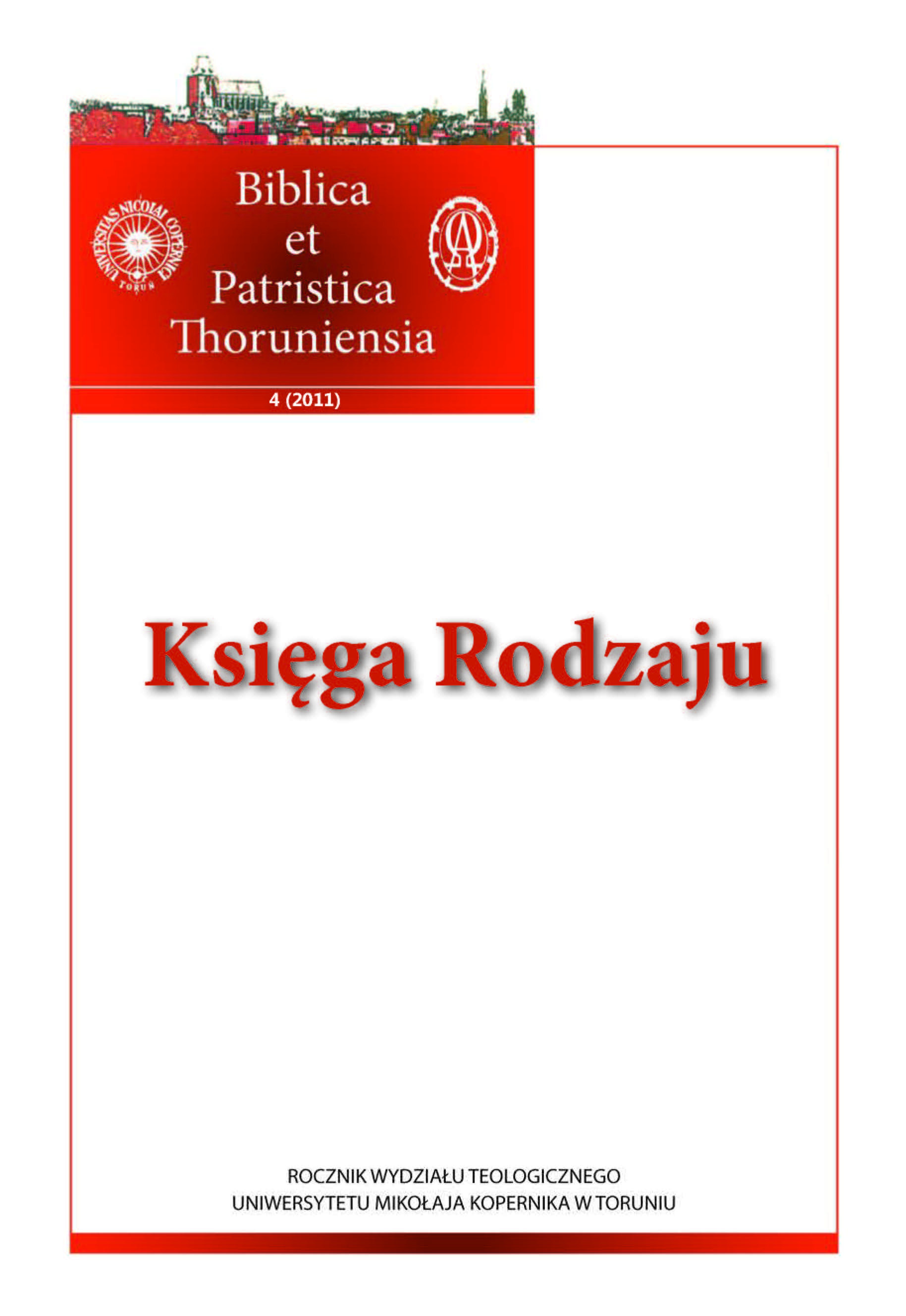Creación como relatio, assimilatio y processio. En torno a la exégesis de santo Tomás de Aquino al Gen 1,1–2,3
DOI :
https://doi.org/10.12775/BPTh.2011.009Mots-clés
egzegeza średniowieczna, stworzenie ex nihilo, stworzenie i Trójca Święta, Tomasz z AkwinuRésumé
Stworzenie jako relatio, assimilatio i processio Wokół egzegezy św. Tomasza z Akwinu do Rdz 1,1–2,3
Tomasz z Akwinu należy do grona tych średniowiecznych teologów, których komentarze biblijne, zwłaszcza poświęcone księgom Starego Testamentu, wciąż czekają na odkrycie i dogłębne studium. Biblijny styl sacra doctrina nie wyraża się jedynie w pozostawionych przez św. Tomasz komentarzach, będących co istotne zapisem jego uniwersyteckich wykładów, ale także ciekawymi propozycjami egzegetycznymi, które możemy odnaleźć w jego dziełach systematycznych (np. w Sumie teologii). Warsztat egzegety średniowiecznego opiera się na fundamentalnej zasadzie jedności planu zbawczego i wpisuje się zawsze w kontekst Tradycji, zaskakując jednak oryginalnością spojrzenia, które pragnie pozostać spojrzeniem uniwersalistycznym (stąd szukanie pomocy w filozofii i jej terminologii). Czytelnym przykładem stylu egzegezy mistrza z Akwinu jest interpretacja opisu stworzenia świata z Rdz 1,1–2,1, nawiązująca do trzech zasadniczych modeli rozumienia istoty aktu stwórczego i jego konsekwencji: jako relacja, asymilacja lub pochodzenie. Ta triada pojęć jest niezbędna, aby w pełni odkryć bogactwo Tomaszowej wykładni Rdz,1,1–2,1, opartej na potrójnym dziele dokonanym przez Boga: opus creationis, distinctionis et ornatus. Raz jeszcze Tomasz ujawnia tym samym swoją programową linię egzegezy: priorytetu sensu literalnego, którego dosłowność polega na odczytania „sensu”, a nie fundamentalistycznej lekturze. Stworzenie dla Tomasza to wolny akt Boga, który powołuje do istnienia wszechświat z niczego (ex nihilo), ale także utrzymuje go w istnieniu (creatio continua). Obejmuje całą rzeczywistość, zarówno materialną i duchową, wyrażając tym samym podstawową zależność stworzenia od Stwórcy: wszystko bowiem posiada swoje istnienie od Niego (habens esse). W aspekcie ad extra, stworzenie jest komunikacją dobroci i jako takie winno być postrzegane w perspektywie trynitarnej. Stworzenie, będąc czasowym pochodzeniem ad extra jest przedłużeniem odwiecznych pochodzeń ad intra w Trójcy Św. Dlatego to Duchowi Świętemu przypisuje Tomasz działanie stwórcze i zbawcze. Wielość stworzenia jest uczestnictwem w pełni życia trynitarnego.
Références
Bellemare R., La Somme de Théolo- gie et la lecture de la Bible, Colloque commemorative Saint Thomas d'Aquin 1274-1974, t. 2, Église et Théologie, 5, Université Saint Paul, Ottawa 1974.
Benedicto XVI, Adhortación Apostólica Verbum Domini.
Cerbelaud D., La création «ex nihilo» en question, "Revue thomiste" 90 (1990), 357-372.
Chenu M. D., Wstęp do filozofii św. Tomasza z Akwinu, tłum. H. Rosnerowa, Kęty 2001.
Cottier G., La doctrine de la création et le concept de néant, "Acta Philosophica" t. 1/1 (1992), 6-17.
Di Noia J. A., Christ brings freedom from sin and death: the commentary of st. Thomas Aquinas on Romans 5:12-21, "The Thomist" 73 (2009), s. 381-398.
Gadamer H., Prawda i metoda. Zarys hermeneutyki filozoficznej, Kraków 1993.
Horst U., Das Wesen der "auctoritas" nach Thomas von Aquin, "Munchener Theologische Zeitschrift" 13 (1962), 155-172.
Humbrecht T. D., Trinité et création au prisme de la voie négative chez saint Thomas d'Aquin, Parole et Silence, Paris 2011.
Levering M., Participatory Biblical Exegesis. A Theology of Biblical Interpretation, University of Note Dame Press, Note Dame 2008.
Maillard P. Y., "Christus clarificatus in passione": l'influence de Jean Chrysostome sur Thomas d'Aquin. Un exemple, "Nova et Vetera" 4 (2010), 365-381.
Margelidon Ph. M., Floucat Y., Dictionnaire de philosophie et de théologie thomistes, Parole et Silence, Paris 2011.
Maryniarczyk A., Kreacjonizm jako punkt zwrotny w interpretacji rzeczywistości, en: Filozofia - wzloty i upadki, XXXIX Tydzień Filozoficzny KUL, 3-6 marca 1997, Lublin 1998, 60-70.
Mróz M., Roszak P., Perfectus secundum intellectum et affectum. Ideał egzegety i jego pracy komentatorskiej wg Tomasza z Akwinu, "Teologia i Człowiek" 10 (2007), 113-130.
Riaudel O., Le monde comme histoire de Dieu, coll. Cogitatio Fidei, 256, Paris 2007.
Roszak P., Disputatio en la vida de la universidad medieval a la luz del Verbum Abbreviatum de Pedro Cantor, en: Dysputy Nawarryjskie w Toruniu, red. P. Roszak, KPTKO, Toruń 2010, 149-162.
Szulakiewicz M., Filozofia jako hermeneutyka, WN UMK, Toruń 2004.
Tilliette X., Les philosophes lisent la Bible, coll. Philosophie et Théologie, Cerf, Paris 2001.
Téléchargements
Publié-e
Comment citer
Numéro
Rubrique
Licence
CC BY ND 4.0. Posiadaczem prawa autorskiego (Licencjodawcą) jest Autor, który na mocy umowy licencyjnej udziela nieodpłatnie prawa do eksploatacji dzieła na polach wskazanych w umowie.
- Licencjodawca udziela Licencjobiorcy licencji niewyłącznej na korzystanie z Utworu/przedmiotu prawa pokrewnego w następujących polach eksploatacji: a) utrwalanie Utworu/przedmiotu prawa pokrewnego; b) reprodukowanie (zwielokrotnienie) Utworu/przedmiotu prawa pokrewnego drukiem i techniką cyfrową (e-book, audiobook); c) wprowadzania do obrotu egzemplarzy zwielokrotnionego Utworu/przedmiotu prawa pokrewnego; d) wprowadzenie Utworu/przedmiotu prawa pokrewnego do pamięci komputera; e) rozpowszechnianie utworu w wersji elektronicznej w formule open access na licencji Creative Commons (CC BY-ND 3.0) poprzez platformę cyfrową Wydawnictwa Naukowego UMK oraz repozytorium UMK.
- Korzystanie przez Licencjobiorcę z utrwalonego Utworu ww. polach nie jest ograniczone czasowo ilościowo i terytorialnie.
- Licencjodawca udziela Licencjobiorcy licencji do Utworu/przedmiotu prawa pokrewnego nieodpłatnie na czas nieokreślony
PEŁEN TEKST UMOWY LICENCYJNEJ >>
Stats
Number of views and downloads: 632
Number of citations: 0



